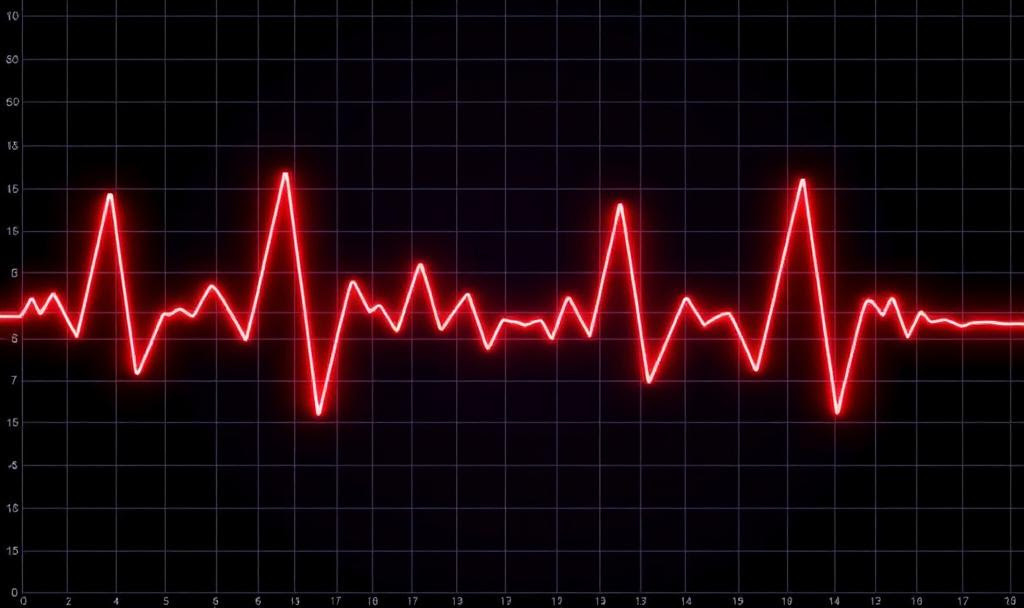Silence on Aisle Nine
(or The Sound of Being Enough)
Beep. Beep. Beep.
The register scans your almond milk, your toothpaste, the protein bars you will forget by Tuesday.
The sound is steady, impersonal. The familiar music of purchase.
Do I really need all these Cheez-Its? Beep.
Another box of paper towels? Didn’t I just buy these? How many spills can one family possibly anticipate?
Beep.
What vegetable is that again? Arugula? Do I even know how to cook arugula, or am I just trying to look like someone who eats arugula?
Beep.
The woman ahead of me has thirty-six cans of sparkling water. I applaud her hydration plans. The guy behind me is buying beef jerky and incense. What hippie keto party is he going to? Everyone’s cart looks like a personality test we did not mean to take.
Beep.
The beeping grows louder. It’s so defining. It’s like I’m always either buying something, wanting to buy something, or worried about not being able to buy something.
Beep.
Somewhere mid-cart, the beeps begin to feel like a heartbeat.
A hospital monitor.
Beep. Beep. Beep…
If you listen closely, the register is announcing something about your aliveness—or your quiet dying.
Every item—batteries, berries, bread—is another small jolt of proof that you’re here, still moving through the world.
But maybe it is the opposite. Maybe the beeps are not telling us we are alive. Maybe they are counting us down.
“If I am what I have and if what I have is lost, who then am I?”
— Erich Fromm, To Have or To Be?
The Noise We Mistake for Life
I catch myself doing it all the time: filling the cart, filling the calendar, filling the air with sound.
A podcast on the drive. News alerts at checkout. A playlist called Morning Motivation streaming into my skull before the second coffee.
There seems to always be a soundtrack demanding I perform: the earnest shopper, the busy citizen, the aspiring sage who reads Merton during coffee breaks.
Noise feels like proof of life.
Speaking of Merton -
“Our being is silent, but our existence is noisy. It is in silence that we find life.”— Thomas Merton, The Springs of Contemplation
I tell myself I am comfortable with silence, but there are days when the loneliness seeps in and I fear that silence might mean I have disappeared. If there isn’t a soundtrack, how do I perform?
What’s the soundtrack of your life?
Is it a war march, a marketing jingle, a lullaby you forgot the words to?
We live in a culture where noise = life, having = life, performing = life. We call it “wanting more out of life,” but usually it’s just more in life—more objects, opinions, hustle.
More. More. More.
Beep. Beep. Beep.
What if the deeper invitation, the one our bodies and souls are starving for, is less?
The Gospel of Less
Most religions tell some version of the same story — the gospel of less.
Different languages, same invitation: to set down what we clutch so that life can hold us again.
Buddha called it non-attachment. The Hindus call it vairāgya, acting without clinging to results. In Islam, it’s zuhd—the simplicity that keeps the heart soft to God. The Taoists talk about wu wei, the way of doing less so that life can move through you. And Judaism builds it right into the week: Sabbath, a holy un-doing, a pause from proving and producing.
And then there’s the Christian story of the rich young ruler.
He’s not a villain. He’s earnest, devout, probably better behaved than most of us. He wants eternal life. He’s done everything right.
Jesus looks at him—Mark says, “and loves him”—and then offers the invitation no one wants: “Go, sell what you have, give to the poor, and you will have treasure in heaven. Then come, follow me.”
Not because wealth is evil, but because attachment is. Jesus doesn’t shame ambition; he redefines abundance.
Maybe holiness begins right here, in the checkout line, when we notice what we reach for without hunger.
The treasure isn’t in the having.
It’s in the letting go.
It’s in the leaving.
You lack one thing: less.
Meister Eckhart’s Counterbeat
Meister Eckhart, the 13th-century mystic, called detachment—abegescheidenheit—“the supreme virtue.”
He wrote that a detached soul “should be as free as a mountain of lead, unmoved by a breeze.” For him, freedom wasn’t getting what you want; it was no longer needing to.
Eckhart’s paradox is radical: Once a person has let go of himself, then he has really let go.
The shedding isn’t just of stuff but of identity because the self that must always prove, perform, and possess.
Detachment isn’t numbness. It’s spaciousness—the room where God can breathe again.
Across centuries, mystics have been humming the same quiet tune.
It’s hidden in John of the Cross “the dark night.”
tucked away in Thomas Merton’s “hidden wholeness.”
and in what Simone Weil called pure attention “prayer.”
All of them whisper the same refrain:
Less, less, less.
The Science of Less
Modern psychology agrees with the mystics.
A 2021 review of 23 studies found a consistent link between voluntary simplicity—intentionally reducing consumption or commitment, and higher well-being (Hook et al., Journal of Positive Psychology). People who live with less report less anxiety and more meaning.
There’s a caveat, though: simplicity heals only when it’s chosen, not forced. Poverty imposed by injustice doesn’t sanctify; it wounds. The research shows minimalism helps most when the letting-go is internally motivated, when you give up not because you must, but because you’re free to.
Maybe that’s the real test of freedom—not just how we simplify our lives, but how we imagine strength itself. Because even our faith traditions get noisy. The urge to prove, to defend, to win—it sneaks into our prayers and our politics just the same.
The Warrior Ethos Soundtrack
Another soundtrack blares across American Christianity: the warrior march.
“Take back the nation.”
“Reclaim the culture.”
“Stand firm.”
The metaphors of conquest and dominance have become the chorus of Christian nationalism—empire logic wrapped in worship lyrics.
The irony is painful. The Christ who refused the sword, who rode a donkey instead of a warhorse, has been repackaged as a general in a culture war.
But what if the opposite of “Onward Christian Soldier” isn’t cowardice: it’s surrender?
Not resignation, but radical relinquishment. The mystics would call that freedom, and I think Jesus would recognize that a lot more than this “so-called” warrior ethos soundtrack.
The revolution we need might not be a flag to wave, but a sword to lay down.
How tragic it is that they who have nothing to express are continually expressing themselves, like nervous gunners, firing burst after burst of ammunition into the dark, where there is no enemy…. They confound their lives with noise. They stun their own ears with meaningless words, never discovering that their hearts are rooted in a silence that is not death but life. They chatter themselves to death, fearing life as if it were death.
—Thomas Merton
So, enough already with this noise that calls itself courage—this drumming of shields where hearts should be listening. Maybe the real bravery now is to lower the flag, unclench the fist, and move with the kind of strength that heals instead of conquers.
Silence as a Heartbeat
In my own life, transformation hasn’t come through victories but vanishings.
The job that ended.
The prayer that dried up.
The moment I could no longer perform my way into worth.
Each one felt like a small death.
Each one cracked me open to something truer.
So I ask again:
What’s the soundtrack of your life?
Do you know how it sounds when the register stops, when the heart monitor goes flat?
It’s terrifying at first, but underneath the silence, something gentler appears:
The sound of being itself.
The Pulse of Enough
Maybe the gospel we need isn’t “more.”
It’s “enough.”
Meister Eckhart said: “God is not found in the soul by adding anything, but by a process of subtraction.”
That’s not just theology; it’s medicine.
Beep. Beep. Beep.
The cart is empty now. The monitor is quiet.
At first, it feels like loss.
Then you realize: this isn’t death.
It’s the sound of being alive.
If you found a bit of yourself in these words, consider sharing or subscribing. That’s how this work finds its people.





Thanks so much. Brilliant. Found it thanks to Brian McLaren’s share on Facebook. I’m kind of exploring the same themes in my Substack “Finding a Way.” Glad I found your work.